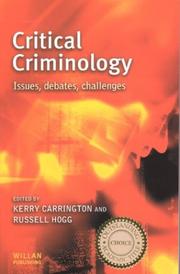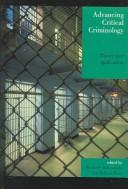| Listing 1 - 10 of 281 | << page >> |
Sort by
|
Book
ISBN: 1412350611 Year: 2006 Publisher: Chicoutimi : J.-M. Tremblay,
Abstract | Keywords | Export | Availability | Bookmark
 Loading...
Loading...Choose an application
- Reference Manager
- EndNote
- RefWorks (Direct export to RefWorks)
Book
ISBN: 9004411674 9004411666 Year: 2020 Publisher: Leiden Boston : BRILL,
Abstract | Keywords | Export | Availability | Bookmark
 Loading...
Loading...Choose an application
- Reference Manager
- EndNote
- RefWorks (Direct export to RefWorks)
This volume is in honor of William J. Chambliss who has influenced and provided a foundation for new directions and approaches in sociology, criminology, critical criminology in particular, and the sociology of law. This is to name a few of the many inspirational and foundational ways he has changed the course and methods for generations to come, inspiring not only the editors and contributors of this volume. Each of the chapters detail various ways Bill’s work has impacted on our own perspectives and/or research including, but not limited to, the way we understand the value of non-traditional methods, law and power, the very definition of crime, organized crime, and unmasking the power structures and powerful that cause inequality, social ills and pains. Contributors are: Elizabeth A. Bradshaw, Meredith Brown, William J. Chambliss, Francis T. Cullen, Jeff Ferrell, David O. Friedrichs, Mark S. Hamm, Ronald C. Kramer, Teresa C. Kulig, Raymond Michalowski, Christopher J. Moloney, Ida Nafstad, Sarah Pedigo, Gary Potter, Isabel Schoultz.
Book
ISBN: 9780774818346 Year: 2010 Publisher: Vancouver University of British Columbia
Abstract | Keywords | Export | Availability | Bookmark
 Loading...
Loading...Choose an application
- Reference Manager
- EndNote
- RefWorks (Direct export to RefWorks)
Book
ISBN: 9780367443870 9780367443894 0367443899 Year: 2022 Publisher: Abingdon: Routledge,
Abstract | Keywords | Export | Availability | Bookmark
 Loading...
Loading...Choose an application
- Reference Manager
- EndNote
- RefWorks (Direct export to RefWorks)
The concept of critical criminology – that crime and the present-day processes of criminalization are rooted in the core structures of society – is of more relevance today than it has been at any other time. Written by an internationally renowned scholar, Contemporary Critical Criminology introduces the most up-to-date empirical, theoretical, and political contributions made by critical criminologists around the world. In its exploration of this material, the book also challenges the erroneous but widely held notion that the critical criminological project is restricted to mechanically applying theories to substantive topics, or to simply calling for radical political, economic, cultural, and social transformations. Now fully updated and expanded in a new edition, this book offers further coverage of new directions in critical criminology, covering topics such as: Green criminology ; Indigenous criminology ; Intersectionality ; Narrative criminology ; Rural critical criminology ; Queer criminology ; Zemiology ; Critical research methods ; Contemporary critical criminological policies. Written in a clear and direct style, this book is an essential source of reference for both undergraduate and postgraduate students of criminology, deviance and social control, criminological theory, social policy, research methodology, and criminal justice
Critical criminology. --- Criminology --- Critical criminology

ISBN: 1903240689 Year: 2002 Publisher: Cullompton : Willan publishing,
Abstract | Keywords | Export | Availability | Bookmark
 Loading...
Loading...Choose an application
- Reference Manager
- EndNote
- RefWorks (Direct export to RefWorks)
Critical criminology. --- Critical criminology --- Radical criminology --- Criminology
Book
ISBN: 3658134968 Year: 2016 Publisher: Wiesbaden : Springer Fachmedien Wiesbaden : Imprint: Springer VS,
Abstract | Keywords | Export | Availability | Bookmark
 Loading...
Loading...Choose an application
- Reference Manager
- EndNote
- RefWorks (Direct export to RefWorks)
Die systemtheoretisch orientierte Monografie untersucht Phänomen und Funktion von Illegalität. Sie enthält außerdem die Ausarbeitung des neuen Theoriestücks der Modalmedien. Illegalität ist ein solches Modalmedium, das sich an rechtlich-politischen Unvereinbarkeiten entzündet. Es stellt auf der Ebene der Inklusion und Exklusion von Organisationen und Personen und in Bezug auf die Selbstbeobachtung der Weltgesellschaft ein Beobachtungspotential bereit, um diese formalen Unvereinbarkeiten auf illegale Weise vereinbar zu machen. So wird durch Illegalität eine zugleich destabilisierende und stabilisierende Behandlung innerer und äußerer Systemgrenzen ermöglicht, indem unvereinbare formale Erwartungen verletzt und genau dadurch erfüllt werden. Das Modalmedium ermöglicht demnach die Systemreproduktion auch dann, wenn sie durch rechtlich-politische Unvereinbarkeiten gefährdet ist. Der Inhalt Begriffliche Vorarbeiten ● Verbotene Realität ● Evolution des Verbotenen - Teil I: vom Tabubruch zum Verbrechen ● Evolution des Verbotenen - Teil II: Kriminalität ● Zwischenstand: Bedingungen von Illegalität ● Vorformen von Illegalität ● Gesetzlichkeit ● Sozialismus und Nationalsozialismus – und Illegalität ● Erste Beschreibungen von Illegalität ● Illegalität: Annäherungen an ein Medium ● Einschub: Kommunikationsmedien ● Legalität und Illegalität ● Illegalität als Modalmedium ● Funktionale Äquivalente für Illegalität ● Vernetzung, Korruption und Illegalität ● Ordnung der Exklusionen Die Zielgruppen ● Studierende und Lehrende der Soziologie, der Politologie, der Kulturwissenschaft, der Medientheorie ● KrimininalsoziologInnen ● Alle an Systemtheorie Interessierte Der Autor Uli Reiter ist Wissenschaftler, freier Künstler und Marketingdienstleister. www.illegalitaet.com www.illegalität.de.
Sociology. --- Critical criminology. --- Sociological Theory. --- Critical Criminology.
Book
ISBN: 9789004411661 Year: 2019 Publisher: Leiden ; Boston : Brill,
Abstract | Keywords | Export | Availability | Bookmark
 Loading...
Loading...Choose an application
- Reference Manager
- EndNote
- RefWorks (Direct export to RefWorks)
This volume is in honor of William J. Chambliss who has influenced and provided a foundation for new directions and approaches in sociology, criminology, critical criminology in particular, and the sociology of law. This is to name a few of the many inspirational and foundational ways he has changed the course and methods for generations to come, inspiring not only the editors and contributors of this volume. Each of the chapters detail various ways Bill's work has impacted on our own perspectives and/or research including, but not limited to, the way we understand the value of non-traditional methods, law and power, the very definition of crime, organized crime, and unmasking the power structures and powerful that cause inequality, social ills and pains. Contributors are: Elizabeth A. Bradshaw, Meredith Brown, William J. Chambliss, Francis T. Cullen, Jeff Ferrell, David O. Friedrichs, Mark S. Hamm, Ronald C. Kramer, Teresa C. Kulig, Raymond Michalowski, Christopher J. Moloney, Ida Nafstad, Sarah Pedigo, Gary Potter, Isabel Schoultz.
Book
ISBN: 0761874550 Year: 2024 Publisher: Lanham, Maryland : Hamilton Books,
Abstract | Keywords | Export | Availability | Bookmark
 Loading...
Loading...Choose an application
- Reference Manager
- EndNote
- RefWorks (Direct export to RefWorks)
"Peacemaking criminology is a humane, nonviolent, and scientific approach in its treatment of crime and the offender. This is a collection of twelve essays that provides readers with an understanding of peacemaking criminology"--

ISBN: 073911252X 0739151673 9780739151679 9780739112526 0739112538 9780739112533 Year: 2006 Publisher: Lanham Lexington Books
Abstract | Keywords | Export | Availability | Bookmark
 Loading...
Loading...Choose an application
- Reference Manager
- EndNote
- RefWorks (Direct export to RefWorks)
Advancing Critical Criminology constitutes a timely addition to the growing body of knowledge on critical criminology scholarship. DeKeseredy and Perry have assembled a volume that provides scholars with an in-depth review of the extant literature on several major branches of criminology as well as examples of how critical criminologists apply their theoretical perspectives to substantive topics, such as drugs, interpersonal violence, and rural crime.
Critical criminology. --- Radical criminology --- Criminology
Book
ISBN: 9781137456250 Year: 2015 Publisher: Basingstoke : Palgrave Macmillan,
Abstract | Keywords | Export | Availability | Bookmark
 Loading...
Loading...Choose an application
- Reference Manager
- EndNote
- RefWorks (Direct export to RefWorks)
| Listing 1 - 10 of 281 | << page >> |
Sort by
|

 Search
Search Feedback
Feedback About UniCat
About UniCat  Help
Help News
News